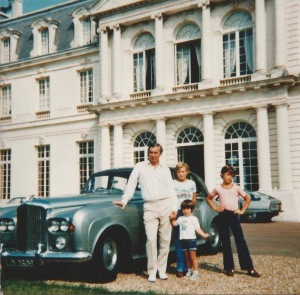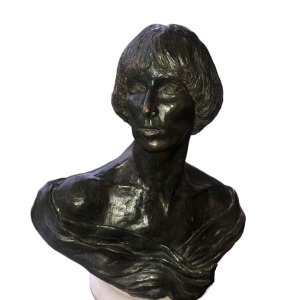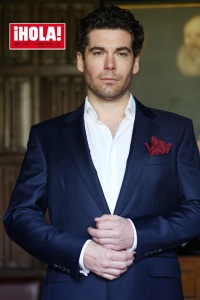Alexander Fiske-Harrison is an author, journalist and conservationist. He is also a noted amateur bullfighter and bull-runner. (And an amateur polo player, his fiancée being Edelfräulein Klarina Pichler from Austria, one of the top ten ranked female professional players in the world.)
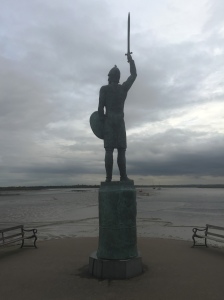
A statue on Maldon Promenade of the leader of the defeated Saxon army, Earl Byrhtnoth, killed in the Battle of Maldon by Vikings, including the Fiskes, in 991 A.D. (Photo: Alexander Fiske-Harrison)
Alexander was born in London in 1976, the youngest of three brothers growing up between Belgravia in London and Layer-de-la-Haye in rural East Anglia.
The Fiske family first arrived in England a few miles from the present family home in East Anglia as Viking victors at the Battle of Maldon in 991 A.D. (as recounted in the Anglo-Saxon poem.)
The Fiske family has long had links to the neighbouring University of Cambridge. Cousin, double Olympic gold medallist and fighter pilot, Billy Fiske – the first American to die in combat in WWII – studied there, as did ancestor and 18th century High Sheriff of Essex and Lord of the Manor of Copford, Major Fiske Goodeve Fiske-Harrison.
After graduating from Cambridge, Alexander’s father Clive Fiske Harrison began his career as stockbroker in the City of London at Panmure Gordon & Co under Ian Cameron, the father of Prime Minister David Cameron.
In 1966 Clive married Australian sculptor Barbara Gail Horne.
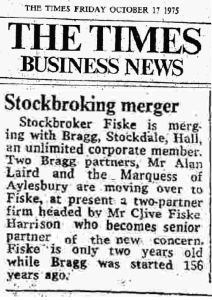 In 1973 Clive founded Fiske & Co., which merged with Bragg, Stockdale, Hall & Co, founded in 1819, and later listed on the London Stock Exchange as Fiske plc.
In 1973 Clive founded Fiske & Co., which merged with Bragg, Stockdale, Hall & Co, founded in 1819, and later listed on the London Stock Exchange as Fiske plc.
Alexander´s eldest brother Byron Fiske Harrison became a cavalry officer in the British Army before joining Cazenove & Co – now J. P. Morgan Cazenove – and then becoming a director of Goldman Sachs.
Alexander’s older brother, Jules, who died in a skiing accident in Switzerland in 1988, was, according to The Times, “a famously skilled and fearless skier” and the Daily Telegraph, “a formidable athlete on the slopes.”
Alexander was educated at Eton and then at the Universities of Oxford and London, beginning in Biological Sciences after a lifelong fascination with animals, having joined the World Wildlife Fund (as it then was) in 1988, aged 11, and Greenpeace in 1992. He has remained a member of the WWF for three and a half decades.
From 1994, he studied biology under Dr Malcolm J. Coe of the Department of Zoology at Oxford University and who ran ran their Animal Ecology Research Group in the Tsavo National Park in Kenya, specialising in elephant ecology.
Alexander went on to study Philosophy, Politics and Economics, specialising in the thought Immanuel Kant under Dr John D. Kenyon making him part of an unbroken line of teaching back to Kant himself. He also specialised in the later thought of the Post-Kantian Austrian philosopher Ludwig Wittgenstein.
At the London School of Economics and Political Science he studied as a postgraduate at Wittgenstein’s rival Austrian, Karl Popper’s old Department of Philosophy, Logic and Scientific Method. Alexander wrote his thesis on the possibility of revising the laws of classical logic in the light of quantum theory in physics, as well as studying the foundations of biology, psychology and consciousness under Professor David Papineau at King’s College, London.
Alexander left academia in 2001 with Bachelor and Master of Arts degrees from the University of Oxford and Master of Science degree from the University of London.
His first professional journalism was for The Times in 1998, aged 21, on his travels in North Africa and Spain in The Times. He has since also written for the Financial Times, Daily Telegraph, The Spectator, Prospect, Frieze and Condé Nast’s GQ and Traveller magazines. He has also written in Spanish for ABC, El Norte de Castilla and Diario de Navarra.
He has been profiled in The Times, The New York Times, Condé Nast’s Tatler, ABC, ¡Hola! magazine in Spain and has been interviewed on the BBC, CNN, Al-Jazeera, and presented on the Discovery Channel for Bear Grylls.
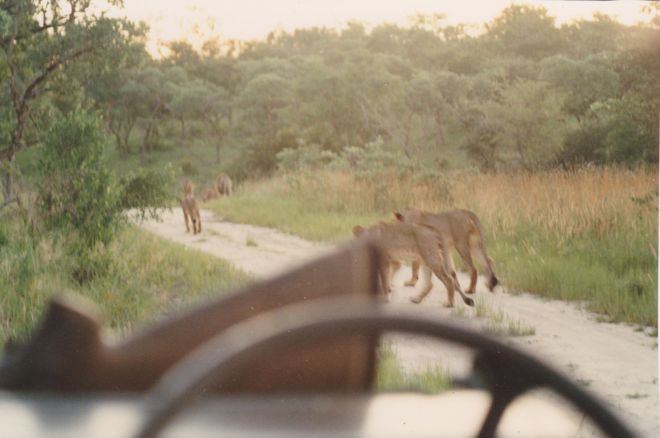
Following lions in the Kruger Park, South Africa (Photo: Alexander Fiske-Harrison)
His first long feature article was after serving as a judge on the Artificial Intelligence Turing Test, the 10th Loebner Prize, in 2000, the largest and most contest of AI in the world. He wrote the commentary essay on that and the philosophy of AI, Alan Turing and Ludwig Wittgenstein for The TLS. His conclusions were technical but wide-ranging,
“The truth of the matter is hard to come by. Sufficiently good simulations of humans will inevitably come, and when they do, we may end up with no choice but to concede to their consciousness. One of the problems of consciousness is that we “identified” people and certain animals as conscious long before we “knew” (in the linguistic sense) they were so. Now scientific enquiry begs us to name our conditions for identifying something as conscious, and the trouble is that we do not really have any…. Wittgenstein hit this nail on the head with the comment, “My attitude towards him was an attitude towards a soul. I am not of the opinion that he has a soul.” For if it was mere opinion, or a piece of ordinary knowledge, it could be disconfirmed, which our thoughts on the consciousness of others can not.”
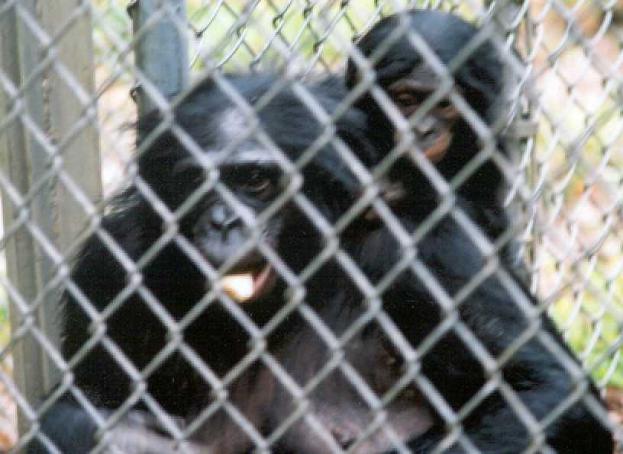
Bonobos Panbanisha and her son Nyota at the Ape Language Research Centre of Georgia State University, USA, in 2001 (Photo: Alexander Fiske-Harrison)
Continuing the theme of non-human intelligence he visited Georgia State University’s Language Research Centre in Atlanta to spend time with Professor Sue Savage-Rumbaugh, the bonobo Kanzi and the other Great Apes housed there. He wrote about his experience, the philosophy and the science of ape language research and its bearing on animal welfare in a cover-page essay for the FT ‘Weekend’, concluding that,
“It is only by fully grasping the intellectual capacities of the apes that we will be able to provide them with even rudimentary welfare standards.
[For] the great danger now is that great apes are kept alive merely to prevent the species going extinct, housed for generations in a prison-like environment that could produce mental deterioration leading to full mental disorder.”
* * *
As an undergraduate student, Alexander had been a winner of the Oxford New Writing Prize 1998 with his stage play The Death Of An Atheist, which was performed at the Wadham Theatre. He had also acted in Cuppers, the Oxford Drama Society’s annual festival, in W. B. Yeat’s The Only Jealousy Of Emer, directed by his friend, actor Hugh Dancy (Alexander was groomsman at Hugh’s wedding to Claire Danes.)
From 2004-2005 he attended one of New York’s most famous ‘Method’ acting schools, the Stella Adler Conservatory, when its greatest alumnus, Marlon Brando, was chairman. Alexander’s professional debut as an actor was in the Jacobean play The Maiden’s Tragedy at the Hackney Empire in London. His West End debut, as actor and playwright, was The Pendulum in 2008. The U.K.’s longest serving theatre critic, Michael Billington, writing in The Guardian, awarded it three our of four stars and said:
“Fiske-Harrison has clearly done his homework. The author himself plays the disintegrating hero with exactly the right poker-backed irascibility;…it is so refreshing to find a new play that gets away from bedsit angst… one comes away with the sensation of having seen an brilliantly accomplished historical play.”
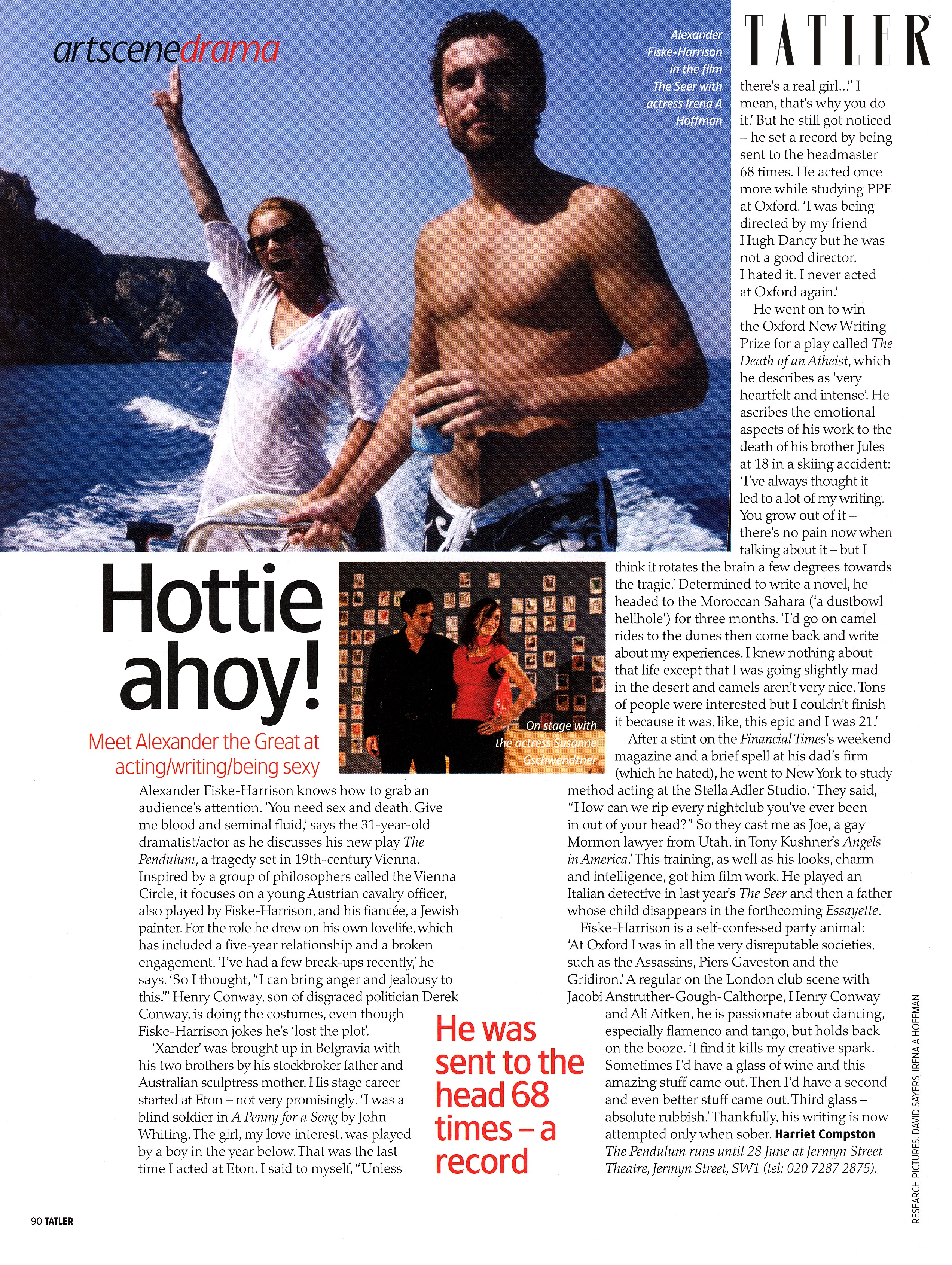
Condé Nast’s Tatler magazine, page 62, Jun. ’08
He also acted in independent film and theatre in the US, Germany and Italy. He was consultant on the Academy Award-nominated Brando documentary, Listen To Me Marlon. He recently returned to acting to help his military veteran friends, starring in the film The Honourable Way Out, a Cold War spy thriller produced by the British Forces Broadcasting Service (BFBS).
* * *
In 2008, Prospect magazine published an essay of Fiske-Harrison’s about Spanish bullfighting, drawing on his studies in animal behaviour, moral philosophy, drama and the half dozen bullfights he had witnessed over the years. Noting that fighting bulls also enter the food chain after death and live three times as long, on average, as meat cattle, and are reared wild, he concluded that,
“There is something ironic about British families sitting down to watch buffalo eviscerated by lions as Sir David Attenborough narrates on the BBC after a nice joint of Sunday roast beef while deploring their Spanish cousins when they are sitting down to watch a bullfight at exactly the same time.”
Inspired to apply the immersive techniques he had first learned in acting to writing – he has been called a ‘Method writer’ both on the BBC and in the national press – Alexander moved to Spain in late 2008 to investigate the subject further. He wrote up his research on his blog, ‘The Last Arena: In Search Of The Spanish Bullfight‘.
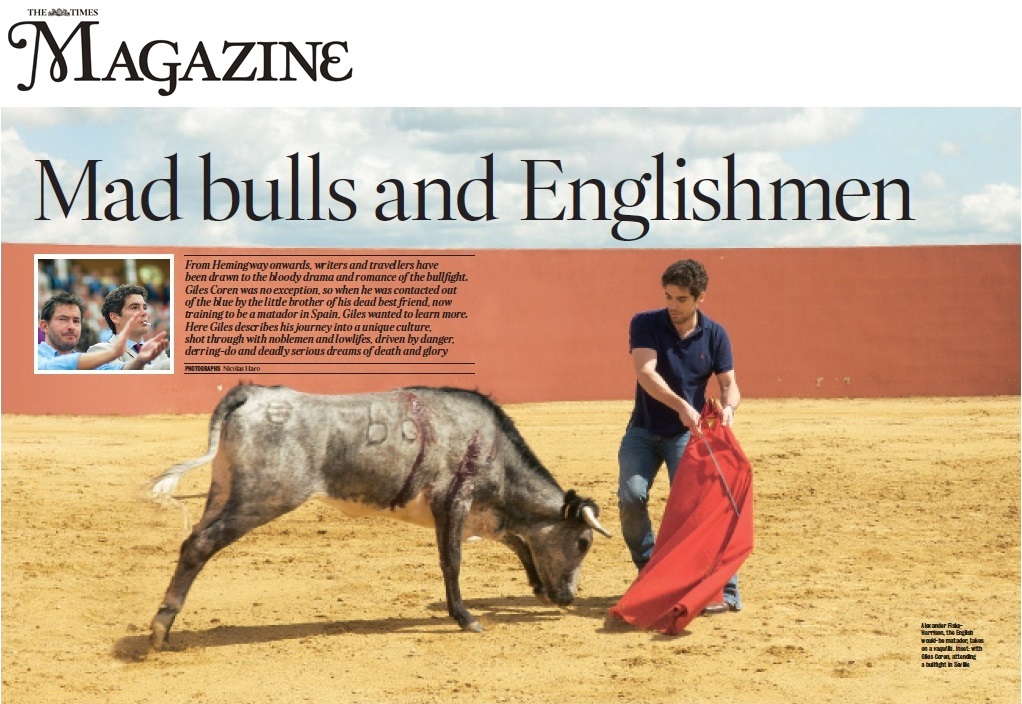
The Times magazine, pages 20-32, Dec. ’09
He turned this into a book, Into The Arena: The World Of The Spanish Bullfight, which was published in the UK on May 26th, 2011 by Profile Books. A critical and commercial success, The Times called him “the bullfighter-philosopher” and it was shortlisted for ‘The Bookie Prize’, the William Hill Sports Book Of The Year Award – “the world’s oldest and richest sports writing prize” – five months later.
His ethical conclusions on the topic were complex. The Daily Mail said that although Alexander “develops a taste for the whole gruesome spectacle, what makes the book work is that he never loses his disgust for it,” the Financial Times said, “it’s to Fiske-Harrison’s credit that he never quite gets over his moral qualms about bullfighting,” and the Literary Review concluded: “The question of whether a modern society should endorse animal suffering as entertainment is bound to cross the mind of any casual visitor to a bullfight. Alexander Fiske-Harrison first tussled with the issue in his early twenties and, as a student of both philosophy and biology, has perhaps tussled with it more lengthily and cogently than most of us.”
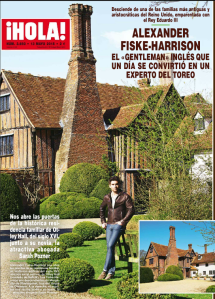
Translated from Spanish: “Descended from one of the most ancient and aristocratic family of the United Kingdom, forefathered by King Edward III: Alexander Fiske-Harrison, – The English Gentleman Who Became An Expert On Bullfighting – We open the gated of the historic family residence, Otley Hall”
He has since lectured on the subject at the University of Seville, for the Foundation of Taurine Studies at the Royal Maestranza of Seville, at the University of Oxford, Eton College, the Edinburgh International Book Festival and alongside the Ambassador of Spain, to an audience including British Members of Parliament and Cabinet Ministers. He currently works with the non-profit organisation, the Fundación de Toro de Lidia, ‘Foundation of the Fighting Bull’.
He has run with the bulls in town across Spain for several years and is the editor and co-author of the 2018 guide to ‘running the bulls’, The Bulls Of Pamplona, the only official guide in the English language, it has a foreword by the Mayor of Pamplona and contributions from John Hemingway, Ernest Hemingway’s grandson, Beatrice Welles, Orson Welles’ daughter, Captain Dennis Clancey of the 101st Airborne, Texas rodeo champion Larry Belcher, and great American and Spanish bull-runners including Joe Distler, Julen Madina, Miguel Ángel Eguiluz, Jokin Zuasti and Josechu Lopez and photos from senior Reuters and European Pressphoto Agency photographer, war correspondent and 50-year Pamplona veteran Jim Hollander and award-winning Spanish photographer Nicolás Haro.
(His 12-page profile in The Times, by their most famous columnist Giles Coren, and the longest profile in the newspaper’s 250-year history, is reprinted online here. His 9-page profile by ¡Hola! ,magazine by Mamen Sánchez, granddaughter of the magazine’s founder, is reprinted in Spanish here and English here)
He is managing director of both Mephisto Productions Ltd. and International Polo Events Ltd. in London as well as being a director of the publicly listed City stockbroking firm Fiske plc and managing director and CEO of Bragg, Stockdale, Hall & Co. Ltd., founded in 1819.

Alexander Fiske-Harrison in 2021 on the podcast of Oxford psychology professor Kevin Dutton, author of The Wisdom Of Psychopaths.
He is currently conducting preliminary research in Scotland, Spain, Romania and Yellowstone National Park in the USA for a book on wolves and dogs and their interactions and common evolutionary heritage with humans, provisionally titled The Land Of Wolves. His blog on his progress is at www.thelandofwolves.com.

